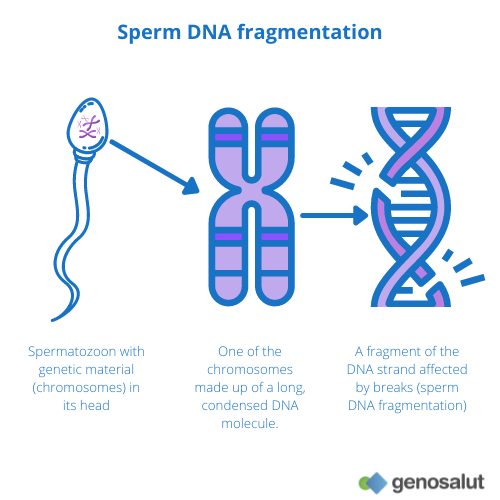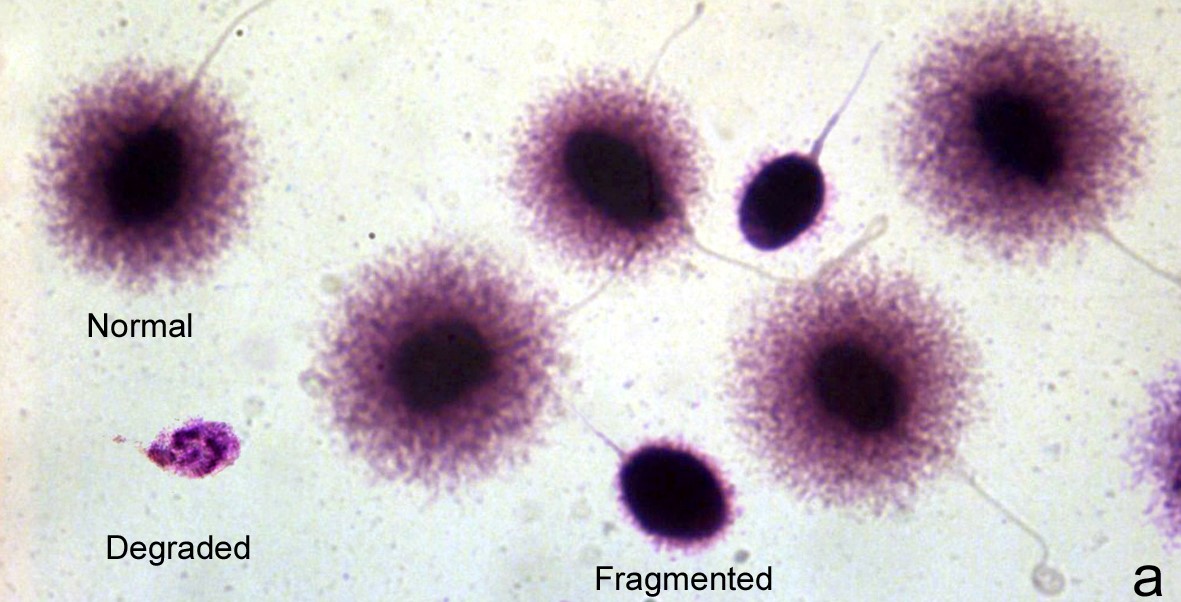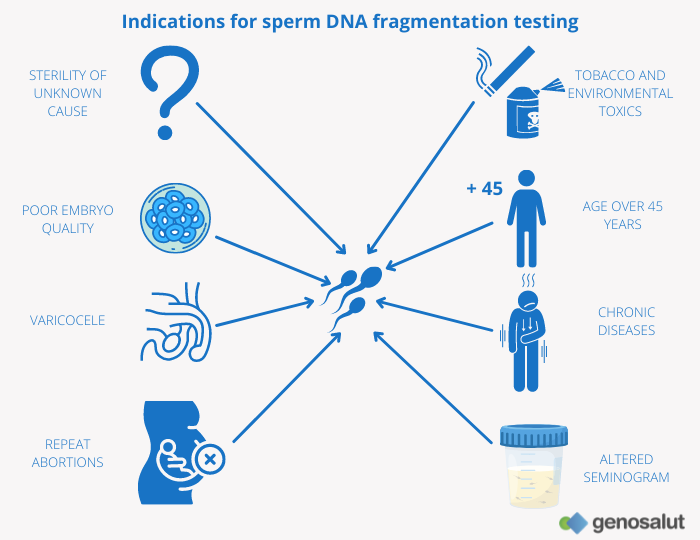Sperm DNA fragmentation test
The sperm DNA integrity (SDI) test analyses the fragmentation of sperm DNA associated with male infertility.
Price
From 250€, depending on the test
Time to result
From 2 weeks, depending on the test
Sperm DNA fragmentation and male infertility
Sperm DNA fragmentation refers to breaks in the genetic material (DNA) contained in the sperm. DNA is a double helix molecule and breaks can affect one or both strands of the helix. These lesions in the genetic material of spermatozoa can be behind fertility problems such as low fertilisation and pregnancy rates, low embryo quality and increased miscarriage rates (even in cases where the other parameters analysed in the semen sample are normal).
DNA fragmentation is an independent and complementary parameter to traditional seminograms and survival tests as it provides valuable information for assessing treatment. It is known that single strand breaks produce different problems than double strand breaks. While the former are related to male sterility (low fertilisation rates), the latter are related to slow embryo development and also to a higher risk of miscarriage.

Sperm DNA fragmentation test
At Genosalut we offer two types of tests to determine sperm DNA fragmentation: the sperm chromatin dispersion (SCD) test, also known as the Halo Sperm test, and the Comet test. Both identify both single and double strand breaks, but only the Comet test is able to distinguish between the two.
Sperm chromatin dispersion test
This test estimates the level of DNA fragmentation indirectly by quantifying the amount of nuclear scatter/halo after sperm lysis and acid denaturation to remove excess nuclear proteins.
Spermatozoa with intact DNA will have large scatter halos, while those with fragmented DNA will have small or absent scatter halos around the head.
It allows establishing the proportion of spermatozoa with fragmented DNA in the total sample analysed (fragmentation index, FI). Calculation of the FI in patients is valuable information for selecting the most effective method of assisted reproduction for each patient.
Sperm quality based on the values obtained:
- Good when the total percentage of fragmented DNA and degraded DNA is less than or equal to 20%.
- Average when it is between 21% and 30%.
- Poor when it is higher than 30%.
 Image from Emeterre, CC BY-SA 3.0, via Wikimedia Commons
Image from Emeterre, CC BY-SA 3.0, via Wikimedia Commons
Comet test
It is the most sensitive assay for detecting sperm DNA fragmentation and is based on a technique known as single cell gel electrophoresis (SCGE).
This assay consists of:
- Encapsulation of the cells in a low melting point agarose suspension.
- Lysis of the cells under neutral or alkaline conditions.
- Electrophoresis of the lysed cells in suspension.
The term “comet” refers to the migration pattern of DNA through the electrophoresis gel, which often resembles a comet.
In the specific case of sperm DNA fragmentation:
- Alkaline lysis assays visualise single and double strand breaks in cellular DNA.
- Neutral lysis assays mainly visualise double-strand breaks.
The Comet system is thus able to differentiate between single and double strand DNA breaks, and a better diagnosis can be made with a more precise study of the type of DNA fragmentation.
Our value proposal
Experience
At Genosalut, we have more than 10 years of experience in counselling people with conditions where a genetic cause has been identified or is thought to be possible.
Proximity
We are a close laboratory, we respond personally and we take the time to explain the report in detail to doctors and patients.
Professional interpretation of results
Because of our knowledge and experience, we are able to accurately interpret genetic results and offer professional advice.
Reference in the field
We are the point of contact for patients, doctors and clinics in all areas of human genetic diagnostics and prevention.
When is sperm fragmentation testing indicated?
Normally, these tests for sperm DNA fragmentation are recommended in the following cases:
- Infertility of unknown cause.
- Repeated implantation failures.
- Embryos of poor quality.
- Varicocele.
- Repeated miscarriages.
- Males over 45 years of age.
- Chronic diseases such as diabetes.
- Male smokers and men exposed to environmental toxins.
- Altered seminogram results.
- Exposure to high temperatures.
In addition, they also recommend when the couple is unable to conceive after having undergone several fertility treatments.

Information thanks to sperm DNA fragmentation test
You can find out the cause of fertility problems
The detection of a high sperm fragmentation index is the possible cause of sterility in men with problems conceiving. Knowledge of this result and counselling by our specialists will allow you to know the possibilities of treatment.
How can I request a sperm DNA fragmentation test?
Request an appointment
Contact us through the form, by e-mail or by telephone to make an appointment with us.
Ask your physician
You can also consult your doctor for information on the possibilities of genetic testing.
We analyse the probe
In our genetic diagnostics laboratory we analyse the sample with the latest technology.
We write a report
We provide a detailed description of the results and, if necessary, genetic counselling.
FAQs
What are the causes of sperm DNA fragmentation?
Sperm fragmentation can be due to a multitude of factors, both internal and external.
Internal causes include:
- Incorrect maturation of the spermatozoa during their development.
- Failures in apoptosis (programmed cell death) that prevent the natural elimination of damaged spermatozoa before ejaculation.
- Excessive production of free radicals (ROS) during sperm transport through the testicle and in the ejaculate.
External causes include:
- Environmental pollution, as pesticides and certain chemical compounds can cause damage to sperm DNA.
- Unhealthy lifestyle: poor diet, smoking, alcohol, drugs…
- Exposure of the testicle to high temperatures, either due to episodes of fever or wearing tight clothing.
- Advanced age of the man (over 45 years).
- Pharmacological treatments, as certain drugs can lead to sperm DNA fragmentation. These include radiotherapy and chemotherapy.
What techniques are available to analyse sperm fragmentation?
There are different tests to measure sperm DNA fragmentation: Tunnel test, Comet test and sperm chromatin dispersion test. They differ mainly in:
- Ability to detect DNA damage directly or indirectly
- Ability to detect single and double breaks
- Ability to distinguish single and double breaks
- Sensitivity
Is there a treatment for sperm DNA fragmentation?
Some of the causes of sperm DNA fragmentation cannot be treated. In other cases, mainly those related to lifestyle, a change of habits can reduce the level of fragmentation. A healthy and balanced diet, physical exercise, giving up tobacco and alcohol can improve sperm quality.
In some cases, oral antioxidant therapy has also been shown to decrease fragmentation and increase the pregnancy rate.
Techniques to achieve pregnancy in cases of sperm fragmentation
To reduce the percentage of spermatozoa with fragmented DNA, the most commonly used techniques in the reproduction laboratory are:
- Chip Fertile: a device that allows the selection of spermatozoa with better motility and less double fragmentation of the DNA chain. It is a slide with two chambers, an input chamber and a collection chamber, connected through a microfluidic channel. The semen sample is placed in the input chamber of the device and, after a period of time, the spermatozoa that have reached the collection chamber are selected.
- MACS (Annexin V columns): a technique designed to selectively remove apoptotic spermatozoa (even those at an early stage with intact cell membranes) from semen samples. This method allows the selection of good quality spermatozoa for use in any assisted reproduction technique, such as intracytoplasmic sperm injection (ICSI).
- IMSI (intracytoplasmic morphologically selected sperm injection): a technique for selecting the best possible sperm for fertilisation using a high-magnification lens prior to injection into the egg in the in vitro fertilisation protocol.
- PICSI (physiological intracytoplasmic sperm injection): a technique for selecting the best possible sperm for fertilisation using hyaluronic acid prior to injection into the egg in the in vitro fertilisation protocol.
- TESA (testicular sperm aspiration) or TESE (testicular sperm extraction): techniques to obtain spermatozoa directly from the testicle, thus avoiding them passing through the epididymis, which can increase DNA fragmentation levels.
Who covers the costs of the DNA fragmentation test?
The DNA fragmentation test is covered by some private insurances and sometimes depends on the fulfilment of certain diagnostic criteria. You can come to us with a certificate from your doctor or with your insurance card.
Request an appointment with us
Opening hours
Monday to Friday from 9.00 am to 1.00 pm
+34 616 59 01 65
info@genosalut.com
Camí dels Reis, 308 (Clínica Palma Planas)
Contact form
Reasons for trusting Genosalut
First genetic diagnosis laboratory in the Balearic Islands
Professionals with experience in medical genetics
Detailed report of the results
Personalised attention for each patient
Wide range of genetic tests
Cutting-edge technology
